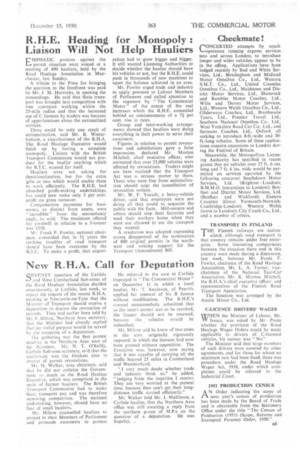R.H.E. Heading for Monopoly : Liaison Will Not Help Hauliers
Page 39

If you've noticed an error in this article please click here to report it so we can fix it.
EMPHATIC protests against the permit situation were voiced at a meeting of 400 hauliers, held by the Road Haulage Association in Manchester, last Sunday.
A tribute to the Press for bringing the question to the forefront was paid by Mr. I. M. Horrocks, in opening the proceedings. He said that State transport was brought into competition with free operators working within the 25-mile radius and that the increased use of C licences by traders was because of apprehensions about the nationalized services.
There could be only one result of nationalization, said Mr. B. Winterbottom, a vice-chairman of the R.H.A. The Road Haulage Executive would finish up by having a complete monopoly. Liaison with the British Transport Commission would not produce for the haulier anything which the H.T.C. wanted for itself.
Hauliers were not asking for denationalization, but for the extra mile or two which would enable them Ii, work efficiently. The R.H.E. had absorbed profit-making undertakings, but could now make only 3 per cent. profit on gross turnover.
Compensation payments for businesses, as distinct from assets, were incredible" from the accountancy angle, he said. The maximum offered for goodwill in relation to a 5-tonner was 050.
M-. Frank F. Fowler, national chairman, contended that in 3i years the teething troubles of road transport should have been overcome by the B.T.C. To make a profit, that organi
zation had to grow bigger and bigger. It still wanted Licensing Authorities to decide whether the haulier should have his vehicles or not, but the R.H.E. could push in thousands of new machines to upset the balance achieved in an area.
Mr. Fowler urged trade and industry to apply pressure to Labour Members of Parliament and called attention to the exposure by "The Commercial Motor" of the extent of the real increases which the R.H.E. concealed behind an announcement of a 7i. per cent, rise in rates.
Group and inter-working arrangements showed that hauliers were doing everything in their power to serve their customers.
Figures in relation to permit revocations and substitutions gave a false impression, declared Mr. Morton Mitchell, chief executive officer, who estimated that over 25,000 vehicles were affected by revocations. Traders might not have realized that the Transport Act was a serious matter to them. Those who were free from nationalization should urge the cancellation of revocation notices.
Mr. W. F. Yorath, a heavy-vehicle driver, said that employers were not doing all they could to acquaint the public with the facts. Mill-owners and others should stop their factories and send their workers home when they were not allowed to use the transport they wanted. A resolution was adopted expressing strong disapproval of the termination of 800 original permits in the northwest and voicing support for the Transport (Amendment) Bill.




































































































